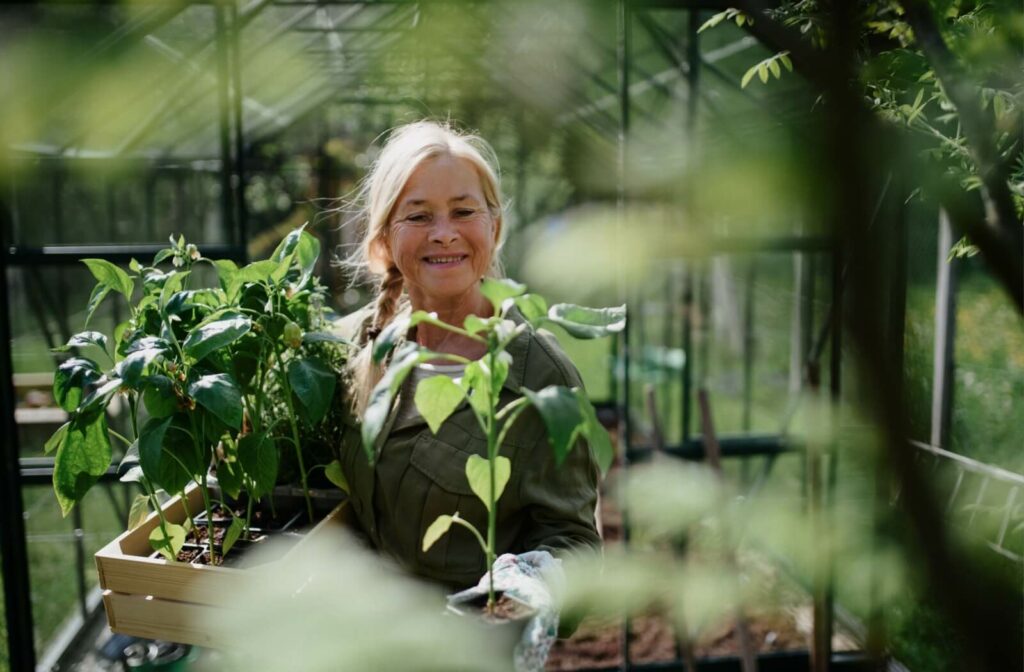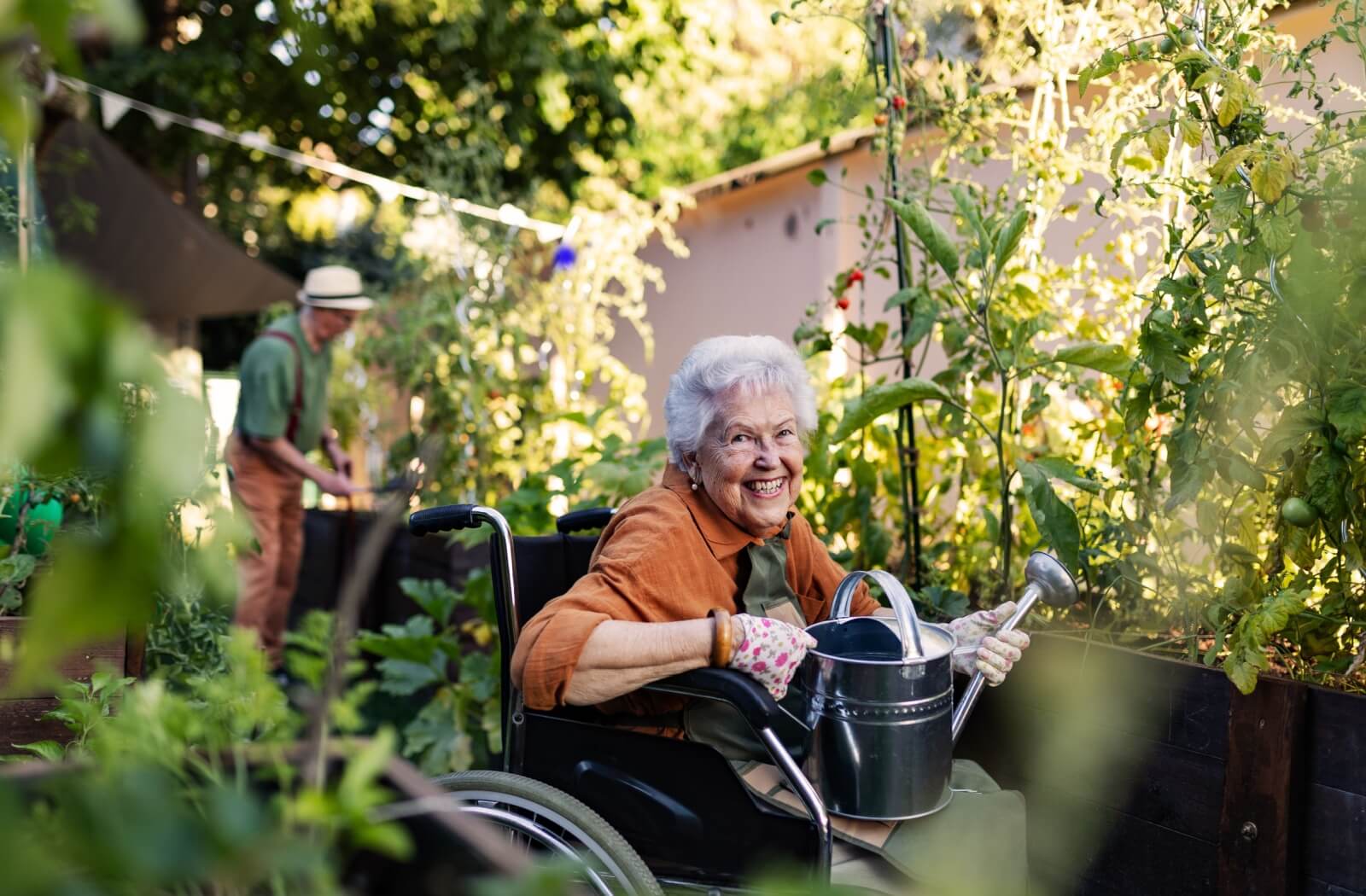Gardening isn’t just about fresh tomatoes or blooming marigolds—it’s a hands-on way to cultivate health and happiness. Whether you’re caring for a cheerful potted plant on your balcony or diving into a garden bed full of possibilities, the physical, mental, and emotional benefits of gardening extend far beyond the soil.
From keeping your body moving to lifting your mood and even sparking connections with others, gardening has a little something for everyone. For older adults, it’s more than a hobby—it’s a pathway to thriving in life’s third act.
Physical Benefits of Gardening
Gardening is an excellent way to stay physically active. It’s a low-impact exercise that can be easily modified to match your physical abilities. Simple tasks like digging, planting, weeding, or watering strengthen muscles, improve flexibility, and promote general physical fitness.
Doing some light gardening for as little as 30 minutes a day can support long-term health and help manage or reduce the risk of certain health concerns. It also promotes better balance and coordination, which may lower the likelihood of falls.
Adaptable gardening solutions like raised beds or vertical gardening systems make it easier to enjoy the physical benefits while minimizing strain. Whether tending a lush garden or nurturing a single pot of herbs, gardening is an empowering way to stay active and connected to nature.

Mental & Emotional Benefits
Gardening isn’t just a hobby—it’s a powerful way to boost mental and emotional well-being. Spending time outdoors, surrounded by greenery, fresh air, and sunlight, helps lower stress and anxiety. The repetitive tasks involved in gardening—like tending plants or pulling weeds—promote mindfulness, offering a peaceful escape from daily worries.
Studies have shown that simply being in green spaces can improve mood and reduce stress. Exposure to plants reduces anxiety, lowers blood pressure, and improves overall emotional health. Gardening also provides a sense of accomplishment—watching a seed sprout and grow into a flourishing plant serves as a tangible reminder of vitality and change.
For many, gardening fosters a sense of purpose and connection to the world. It creates a fulfilling routine, offering something to look forward to each day. For older adults, the act of nurturing plants has been shown to counteract feelings of loneliness and even alleviate symptoms of depression. Gardening can truly remedy the soul, improving emotional well-being and fostering happiness.
Social Benefits & Sense of Community
Not only is gardening an enriching individual activity, but it can also bring people together. Community gardens encourage cooperation, teamwork, and social interaction, helping people build relationships with others who share similar interests.
Gardening programs often involve planting vegetables, flowers, or herbs collaboratively. Sharing the harvest—a bouquet of flowers or a basket of tomatoes—with neighbors is another way to forge connections and create meaningful exchanges. These interactions can significantly improve mental well-being and create a sense of belonging.
Tips for Safe Gardening Practices
Creating a successful and safe gardening experience requires thoughtful planning. Here are some essential tips to ensure you have a safe and enjoyable gardening experience:
- Use ergonomic tools: Light, easy-to-grip tools can make gardening easier on your hands and wrists. Tools with long handles can help you avoid bending or stretching too much.
- Design accessible gardens: Raised garden beds are perfect for reducing the need to kneel or bend. You could also try vertical gardens or hanging baskets to make things more comfortable.
- Prioritize hydration and sun protection: Don’t forget your sunscreen, hat, and plenty of water! It’s best to avoid gardening during the hottest part of the day.
- Break tasks into smaller goals: Keep your gardening sessions short, with breaks in between, to prevent fatigue and make it more enjoyable.
- Opt for low-maintenance plants: Choose hardy plants that are easy to care for, so you can enjoy gardening without feeling overwhelmed.
- Garden together: Gardening with a friend or joining in a group activity makes it safer and more fun!
The Many Benefits of Gardening
Gardening can be a fulfilling way to enrich your life and promote overall well-being. Whether it’s the physical benefits of staying active or the emotional comfort of being surrounded by nature, gardening has something to offer everyone.
At Juniper, we believe in the power of active living and its positive impact on our residents. We’re committed to making gardening an accessible, enjoyable experience that promotes physical and emotional health.
If you’re looking for a place to experience the joy of gardening and much more, we offer a vibrant lifestyle full of opportunities to grow, connect, and live life to the fullest. Discover how we can support you in embracing an active, engaging future—schedule a tour today!







